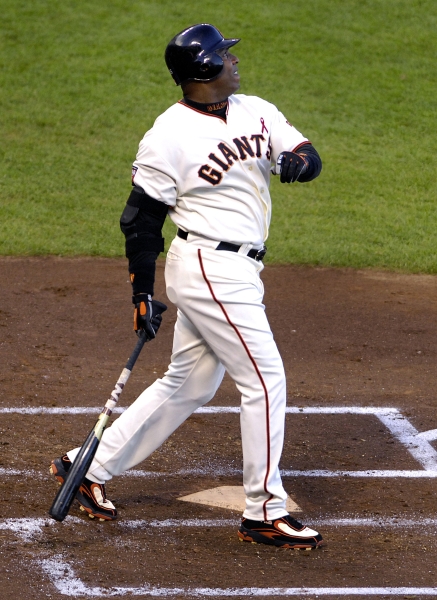 |
 |
|
August 08, 2007
Thank the Pirates
After the 1989 season, Barry Bonds and the Pirates went to arbitration. Bonds lost the case (and this is from memory) in part because the Pirates claimed Barry didn't drive in enough runs. Barry was a leadoff man at the time. So Barry asked to be moved lower in the order so he could drive in runs. Barry's fans stuck by him. At 25, they said, he was just entering his prime years. His critics countered by saying he was a clone of his father--a player whose performance never caught up to his potential. In their postseason arbitration meeting, the Pirates argued that Barry had taken a step backward instead of developing his talents. The arbitor agreed, and Barry lost his case. Pittsburgh also let it be known that Barry could be had for the right price. There were no offers. If the Pirates had recognized the young man's talents and kept him in the leadoff spot, he might have concentrated on getting on base and stealing rather than hitting home runs. Eventually, his talent would win out and he'd be moved lower in the order, but Barry really seems to respond to challenges and slights. His arbitration loss accelerated his rise, going from good leadoff hitter to slugging MVP in one year. Had that not happened, Barry might have been more interested in challenging Rickey Henderson's records than Henry Aaron's. The home run race of 1998, and the attention it diverted from Barry's great year caused him to go after the home run records with a vengence. 
27 July 2007: San Francisco Giants Barry Bonds watches the flight of his 754th home run against Florida Marlins pitcher Rick Vanden Hurk during the first inning at AT&T Park in San Francisco, California. He's certainly an individual driven by a desire to prove he's the best. Whether it was intense workouts, drugs, or a combination of both, Bonds found a way to keep going when others (McGwire, Sosa, Griffey) fell off the record pace. Even two bad knees and a bad elbow could not stop him. Hate Barry or love him over how he reached this goal, but it's tough to deny his burning determination. In most people, that's an admirable quality. Comments
Imagine, if this were today, and if it were any team other than the Pirates, Bonds would have been locked up to a long term contract to avoid arbitration altogether. Posted by: Tom G at August 8, 2007 12:11 PMAnd if it were the Pirates of today, they'd try and trade him for Woody Williams straight up. He may end up breaking some of Henderson's records anyway. He needs only 83 more to be #1 all time in runs scored. Posted by: maynard at August 8, 2007 05:08 PMAnd he already did break Henderson's walks record. Posted by: Andrew at August 8, 2007 10:30 PMAny arbitrator who gave that argument more than a nanosecond of thought before laughing in the face of the Pirates' rep deserves a wound-up kick in the 'nads and a permanent ban from ever deciding a baseball arbitration case again. Period. Posted by: M. Scott Eiland at August 10, 2007 04:15 AMPost a comment
|
|


